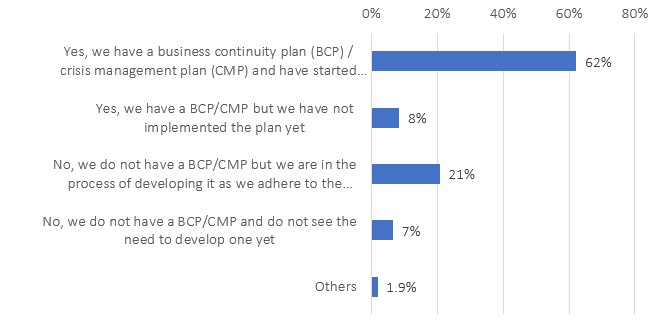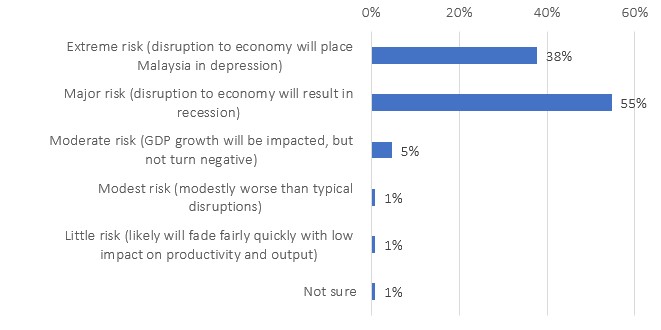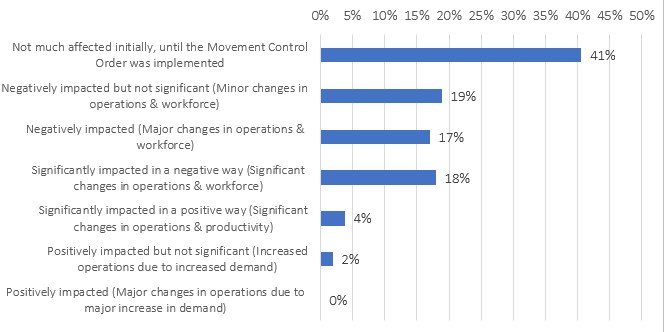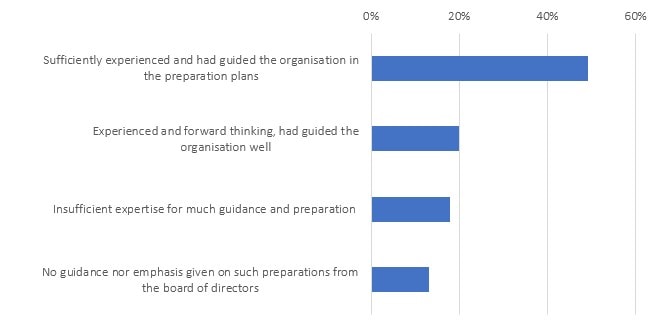ICDM poll reveals that Malaysian boards are equipped to respond
to the negative impact of the COVID-19 pandemic, but cite the need to adapt to the evolving situation
Kuala Lumpur, 30 March 2020: A recent poll by the Institute Corporate Directors Malaysia (‘ICDM’ or the ‘Company’) has revealed that more than two-thirds of Malaysian companies or 70 percent (%) have a business continuity plan (BCP) or crisis management plan (CMP) in place to deal with or mitigate the current COVID-19 crisis, or a similar global pandemic or crisis.

70% Malaysian companies have a business continuity plan (BCP) or crisis management plan (CMP)
With the announcement of the additional 14-day Movement Control Order (MCO) extension to mid-April, businesses are bracing for a much more severe impact. On this front, a staggering 93% of the respondents agreed to this notion, believing that the prolonged pandemic will see further disruptions to the Malaysian economy, which will either place Malaysia into a depression (38%) or recession (55%).

Malaysian companies have to brace for a much more severe impact to their business if the pandemic were prolonged
Michele Kythe Lim, President and Chief Executive Officer of ICDM said, “This is an unprecedented time for businesses in Malaysia. Whilst most of us may have been through earlier crises, the speed of infection and evolving nature of this pandemic is forcing organisations to relook and reconsider their business models, strategies as well as their product and service offerings. As stewards of their company, boards in particular need to be leading this effort. As such, being well-equipped with the right tools and knowledge is critical to play the role in first, safeguarding the welfare of their people and then, the sustainability of their businesses. No more than ever, boards and directors need to urgently act as any further inaction will only prolong the decline of the business – the key is clarity, speed and agility in moving forward. How we behave today will determine the trust our customers and stakeholders will have in us in the future. And this, is critical to the survival of any organisation.”
Of these respondents, 54% have started seeing the negative impacts of the COVID-19 before the implementation of the MCO. 41% also said that day-to-day operations of their businesses were not much affected initially until the MCO took effect. In terms of bottom line, no respondent has seen any positive impact – majority of businesses (57%) were impacted negatively to a varying degree (28% negatively impacted but still in the black; 17% started seeing negative impacts after the MCO was implemented; 15% suffered net losses of less than 10 percent; and 14% suffered net losses of more than 10 percent). 25.5% are still unsure on the impact of COVID-19 and MCO to their bottom line.

Malaysian companies have seen negative impacts to their businesses by the COVID-19 pandemic and the implementation of the MCO
In terms of having a BCP or CMP in place, it is worth noting that whilst two-thirds of respondents have a plan, only 62% have started implementing their plans. 21% have revealed that their organisations do not have any existing BCP or CMP and are only in the process of developing the contingency plan in response to the MCO. Of those with a BCP or CMP, only 17% demonstrated confidence in the effectiveness of their plan, whilst 70% acknowledged that the plans have areas for improvement in adapting to the evolving scenario of COVID-19. 13% felt that the current BCP or CMP are inadequate in addressing the impact to their business and need to be reviewed.
In times of crisis, the role of the board is essential in business continuity. 69% said that their boards are either well-equipped or sufficiently experienced and had guided the organisation in its preparation plans. However, 18% noted there was insufficient expertise from their board in terms of guidance and preparation, while 13% said there was no guidance or emphasis given for such preparations from the board. These calls for more upskilling of directors to better guide and execute their oversight role on the boards they sit on. Director skillsets such as crisis management, followed by leadership skills, communication, risk and compliance, as well as technology and innovation came up top in dealing with such crisis in the future.

More needs to be done for companies to have better crisis preparedness
Michele added, “This is a wake-up call for Malaysian organisations. This is a crucial time for companies to assess their business contingency plan, to ensure that their business is able to withstand the crisis. In fact, it would have been too late if companies only start looking at their plans now. Boards need to realise that crisis management starts long way before a crisis hits – it should be an integral part of the company’s risk mitigation measures and cannot be reactive. A robust framework in crisis management is essential to the survival of the company.”
A guideline with seven (7) key action steps that boards and directors can prioritise amid the uncertainty:
- Communicate clearly, frankly and frequently – Ensure your organisation engage both internal and external stakeholders in conversations promptly, to assure them that you are on top of things.
- Do not be afraid to show compassion – Demonstrate vulnerability and show emotion. We are human after all. However, be sure to back it up with genuine actions of support.
- Act quickly and decisively – Reconfigure your team structure, business processes and supply chain to formulate the best response. Be agile to changes.
- Start paving the path to recovery – Think beyond the flattened curve. Be ready to pivot your business model and form a network of alliances to move in concert towards stability.
- Do not lose sight of other possible risks – Stay vigilant of unintended consequences and take a broader view of risk. Revisit your crisis and continuity plans regularly.
- Broaden your knowledge and skills – This unprecedented crisis calls for boards to expand their capability to guide management through this difficult time effectively. Relook at your board strategies and composition in the longer term.
Take care of your well-being – Pay attention to your mental and physical health to maintain the ability to stay level-headed and exercise good judgment.
“At ICDM, we too are adapting to the new normal and the team has been working hard to not only modify our standard operating procedures but to also enhance our services and facilities, first by customising the topics and themes to the current needs and by offering virtual training and development programmes to boards and directors. We want to continue to support boards and directors by providing relevant tools and knowledge. As an immediate next step, we have curated a webinar series themed ‘Entrusted: Doing the Right Thing to Ensure Continuity, Safety and Security’. In line with our poll findings, the webinar series is anchored on four (4) key priority areas, namely crisis management, authentic leadership, digitalisation and stakeholder engagement. We hope that this webinar series can help boards and directors strengthen their capacity to lead effectively in times of crisis like this,” Michele concluded.
Amongst the recommended next steps for organisations are: to review the human resource policies, revisit the crisis and continuity plans; evaluate the supply chain, identify potential points of failure, communicate effectively not just externally but internally as well; be agile in adapting to the changes and most importantly; not lose sight of other potential risks. Over the longer term, relooking board strategies and composition, ramping up the level of preparedness and adopting a long-term view of their business will be essential for the overall sustainability and success of the organisation.
The ICDM poll was conducted from 19 to 23 March 2020. It examined the views of top-level leadership comprising chairmen (8%), non-executive directors (22%), executive directors (26%), senior executive management (23%) and others (21%) from sectors such as consumer products and services, financial services, property and construction, industrial products and services, energy, healthcare, telecommunication and media, technology and transportation and logistics.
For more information on the poll and the upcoming webinar series for boards and directors, please visit https://icdm.com.my/.
About the Institute of Corporate Directors Malaysia (ICDM):
Institute of Corporate Directors Malaysia (ICDM) is the one-stop centre for all board and director needs, dedicated to enhancing professionalism and effectiveness of directors in Malaysia. Spearheaded by the Securities Commission Malaysia and supported by Bank Negara Malaysia, Bursa Malaysia and the Capital Market Development Fund, ICDM serves as the national institute of directors. For more information on ICDM, please visit our website at https://icdm.com.my/.
For media enquiries, please contact:








